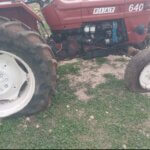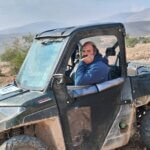A boy injured by a bomb
The 21st of July 2012 began as a normal day for Rami Mohammed Al Jediya. He gathered together his sheep early in the morning and began the walk away from his village, Fasayil al Wusta, into the mountains to spend the day tending his family’s flock. Accompanying him was his brother and the two set off unknowing of what tragedy would befall them. They wound their way through the mountains along the paths they always took until they reached Wadi al Ahmar. Amongst the rolling dunes of the mountains, eleven year old Rami spotted something that caught his eye. It was unusual for him to find any object this far into the mountains and so he bent down and picked it up with curiosity. In his eyes the deadly object resembled a football, round and solid. He was excited and threw it into the air. This action changed his life forever. As soon as it left his hand, his new toy exploded into a thousand pieces, shards embedding themselves into his thigh and hip bone. The boy’s new toy was nothing less then an inactivated bomb, left over from Israel’s military training in the area. The boy was carried off the mountain in his father’s arms and rushed to Jericho hospital. For the next five days, Rami lay there, shrapnel buried in his leg so deeply and complexly that the doctors were unable to fully remove it
The mountains in the Jordan Valley where Palestinian shepherds go to graze their livestock, is fast becoming a dump ground for used and unused weaponry left over by Israel’s military training. Children often collect used tear-gas canisters and play with them as toys. These children have been known to be arrested for possessing such finds as Israel claims they are technically possessing weapons which, when in Palestinian possession, is a crime punishable by arrest
The adult shepherds of the Jordan Valley say that they often come across remnants of Israel’s military training while out in the mountains. They know not to touch them however the children, not always knowing what it is they see, are less fortunate and further tragedies such as Rami’s could easily befall them. This is just another potentially fatal obstacle the already much pressured inhabitants of the Valley are contending with. As was the case with Rami’s accident, no official body either paid the hospital fees nor were held accountable for the crime of disabling an innocent child. There are no signs in the area indicating that there are inactivated bombs as they are scattered haphazardly around the Jordan Valley and any passerby could encounter one
gathered together his sheep early in the morning and began the walk away from his village, Fasayil al Wusta, into the mountains to spend the day tending his family’s flock. Accompanying him was his brother and the two set off unknowing of what tragedy would befall them. They wound their way through the mountains along the paths they always took until they reached Wadi al Ahmar. Amongst the rolling dunes of the mountains, eleven year old Rami spotted something that caught his eye. It was unusual for him to find any object this far into the mountains and so he bent down and picked it up with curiosity. In his eyes the deadly object resembled a football, round and solid. He was excited and threw it into the air. This action changed his life forever. As soon as it left his hand, his new toy exploded into a thousand pieces, shards embedding themselves into his thigh and hip bone. The boy’s new toy was nothing less then an inactivated bomb, left over from Israel’s military training in the area. The boy was carried off the mountain in his father’s arms and rushed to Jericho hospital. For the next five days, Rami lay there, shrapnel buried in his leg so deeply and complexly that the doctors were unable to fully remove it.
The mountains in the Jordan Valley where Palestinian shepherds go to graze their livestock, is fast becoming a dump ground for used and unused weaponry left over by Israel’s military training. Children often collect used tear-gas canisters and play with them as toys. These children have been known to be arrested for possessing such finds as Israel claims they are technically possessing weapons which, when in Palestinian possession, is a crime punishable by arrest.
The adult shepherds of the Jordan Valley say that they often come across remnants of Israel’s military training while out in the mountains. They know not to touch them however the children, not always knowing what it is they see, are less fortunate and further tragedies such as Rami’s could easily befall them. This is just another potentially fatal obstacle the already much pressured inhabitants of the Valley are contending with. As was the case with Rami’s accident, no official body either paid the hospital fees nor were held accountable for the crime of disabling an innocent child. There are no signs in the area indicating that there are inactivated bombs as they are scattered haphazardly around the Jordan Valley and any passerby could encounter one.





